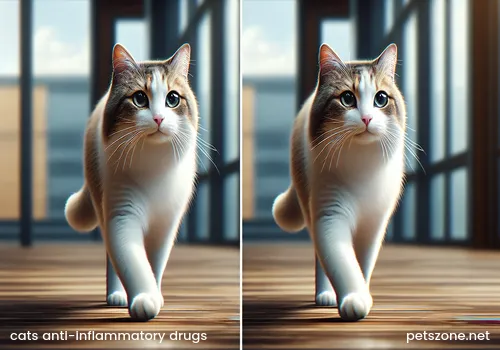What Anti-inflammatory Drugs Are Good for Cats_ Guide to Anti-inflammatory Medication and Precautions for Cats
For "pet owners" who care about their cat’s health, when cats show pain, swelling, or difficulty moving, they often think of using anti-inflammatory drugs to relieve symptoms. However, the physiological structure and drug metabolism of cats differ significantly from humans and even dogs. Arbitrarily using medications on cats is extremely dangerous. In short, there is no single "best" anti-inflammatory drug; the most suitable anti-inflammatory medication for your cat must be diagnosed and prescribed by a professional veterinarian based on the cat’s specific condition, weight, age, and health status. Never give cats human or dog anti-inflammatory drugs on your own.

Inflammatory reactions in cats are a self-protection mechanism of the body against infection or injury, but excessive inflammation can cause pain, discomfort, and even tissue damage. Veterinarians commonly use several major types of anti-inflammatory drugs for cats, each with different mechanisms of action and suitable applications.
Main types of anti-inflammatory drugs for cats
- Non-Steroidal Anti-Inflammatory Drugs (NSAIDs)
- How they work: These drugs act by inhibiting enzymes (mainly cyclooxygenase, COX) in the body that produce inflammation, pain, and fever. They are commonly used to treat mild to moderate inflammation and pain caused by arthritis, postoperative pain, trauma, etc., in cats.
- Cat-specific NSAIDs: Important point! There are NSAIDs specifically developed and approved for cats on the market, such as Meloxicam (brand names may vary), Robenacoxib (brand names may vary), etc. These drugs have undergone rigorous animal clinical trials to establish relatively safe dosages and usage for cats.
- Why not use human NSAIDs? This is very important! Common human NSAIDs like ibuprofen, aspirin, and naproxen are highly toxic to cats. Cats’ livers lack the enzymes necessary to effectively metabolize these drugs, causing accumulation in the body and easily resulting in severe gastrointestinal ulcers, kidney damage, liver damage, and even life-threatening outcomes. Giving a cat a human painkiller can have very serious consequences and is absolutely not worth the risk!
- Usage precautions: Even cat-specific NSAIDs must be used under the guidance of a veterinarian, strictly according to the dosage and course of treatment. The veterinarian may conduct blood tests before use to assess the cat’s kidney and liver function. During medication, if the cat shows symptoms like vomiting, diarrhea, loss of appetite, lethargy, increased drinking or urination, stop the medication immediately and contact the vet. Cats on long-term NSAID therapy require regular follow-ups.
- Corticosteroids
- How they work: These are powerful anti-inflammatory and immunosuppressive drugs, such as Prednisolone and Dexamethasone. They suppress inflammatory reactions by affecting various cells and chemical signals, usually having a stronger effect than NSAIDs.
- Applications: Corticosteroids are often used to treat serious inflammatory diseases in cats, such as severe allergic reactions, asthma, inflammatory bowel disease (IBD), autoimmune diseases, and more.
- Usage precautions: Although effective, corticosteroids have relatively more side effects. Short-term use may cause increased appetite, increased drinking and urination, behavioral changes; long-term or high-dosage use can lead to diabetes, adrenal dysfunction, decreased immunity, thinning skin, and other issues. Corticosteroids must never be stopped abruptly; tapering down according to the veterinarian’s instructions is essential to prevent discomfort or life-threatening conditions. Like NSAIDs, their use must be diagnosed and prescribed by a veterinarian; self-medication is strictly prohibited.
- Other supportive therapies
- For some chronic inflammations, such as arthritis in elderly cats, besides the drugs mentioned above, veterinarians may recommend supportive therapies like:
- Cartilage protectants: Such as glucosamine and chondroitin, which help maintain joint cartilage health and relieve joint pain.
- Omega-3 fatty acids: Fish oil rich in Omega-3 has certain anti-inflammatory effects and benefits skin diseases, arthritis, etc.
- Physical therapy: Moderate exercise, weight control, providing comfortable and warm resting environments can also help alleviate joint discomfort.
- These supportive therapies are generally safer but may not act as quickly or strongly as medications, often serving as a supplement to drug treatment.
- For some chronic inflammations, such as arthritis in elderly cats, besides the drugs mentioned above, veterinarians may recommend supportive therapies like:
Important principles of anti-inflammatory medication for cats
- Diagnosis must be by a veterinarian: Inflammation is just a symptom, which may hide various causes (infection, trauma, autoimmune diseases, etc.). Only a veterinarian can determine the root cause of the inflammation and select the most appropriate treatment, including whether anti-inflammatory drugs are needed and which type to choose.
- Strictly prohibit the use of human or dog medications: Emphasized again, this is the most dangerous behavior! Cats’ unique metabolism means many drugs safe for humans or dogs are highly toxic to them.
- Follow veterinary instructions strictly: The veterinarian will decide the drug type, dose, frequency, and treatment duration according to the cat’s condition. Follow prescriptions strictly; do not arbitrarily increase, decrease, or stop medication early.
- Monitor your cat’s response: Observe your cat’s mental state, appetite, drinking, urination, vomiting, diarrhea, etc., closely during treatment. If any abnormalities appear, contact the vet immediately.
- Inform the vet of your cat’s medical history: When visiting, provide detailed information about your cat’s previous illnesses, allergies, other medications or supplements. This helps the vet make safer medication decisions. Especially for cats with kidney, liver, heart, or gastrointestinal problems, use of anti-inflammatory drugs requires extra caution.
Frequently Asked Questions (FAQ)
- Q: Can a cat with a fever be given human fever-reducing drugs (like ibuprofen)?
- A: Absolutely not! Human fever reducers like ibuprofen and acetaminophen (paracetamol) are highly toxic to cats, causing severe organ damage and even death. A cat with a fever must have the cause diagnosed and treated under veterinary guidance.
- Q: What should I do if my cat accidentally eats human painkillers?
- A: Time is critical! Take your cat immediately to the nearest veterinary hospital and inform the staff what medication, approximate dose, and time of ingestion. This is an emergency.
- Q: Should I pay attention to dosing times when giving anti-inflammatory drugs to cats?
- A: Some anti-inflammatory drugs, especially NSAIDs, are recommended to be given with or after meals to reduce gastrointestinal irritation. Please follow the vet’s instructions specifically. If feeding medication is difficult, consult the vet for easier-to-administer forms (such as liquids or powders that can be mixed with food).
- Q: How long does it take for anti-inflammatory drugs to work in cats?
- A: The onset of effect depends on the drug type, dose, and the cat’s specific condition. Some drugs may relieve pain within hours, while treating chronic inflammation can take days or longer to see noticeable effects. If symptoms do not improve or worsen after several days, contact the vet promptly.
- Q: Can cats use anti-inflammatory drugs long-term?
- A: Long-term use of anti-inflammatory drugs requires great caution and strict veterinary supervision. Long-term NSAIDs use requires regular monitoring of kidney, liver, and gastrointestinal health; long-term corticosteroid use requires evaluating whether benefits outweigh potential side effects and regular check-ups. Veterinarians will weigh pros and cons to devise the safest plan for cats needing long-term treatment.
Summary
Anti-inflammatory medication for cats is a science and a test of the "pet owner’s" responsibility. Faced with a cat’s pain or inflammation, we can understand the feelings, but incorrect medication may cause irreparable harm. Remember, never medicate your cat yourself, especially not with human drugs. Trusting and promptly seeking professional veterinary help is the only correct way to ensure your cat’s health and safety. Veterinarians will choose the safest and most effective anti-inflammatory drugs according to the cat’s condition and guide the correct usage so our beloved cats can recover healthily as soon as possible and enjoy a carefree life.



